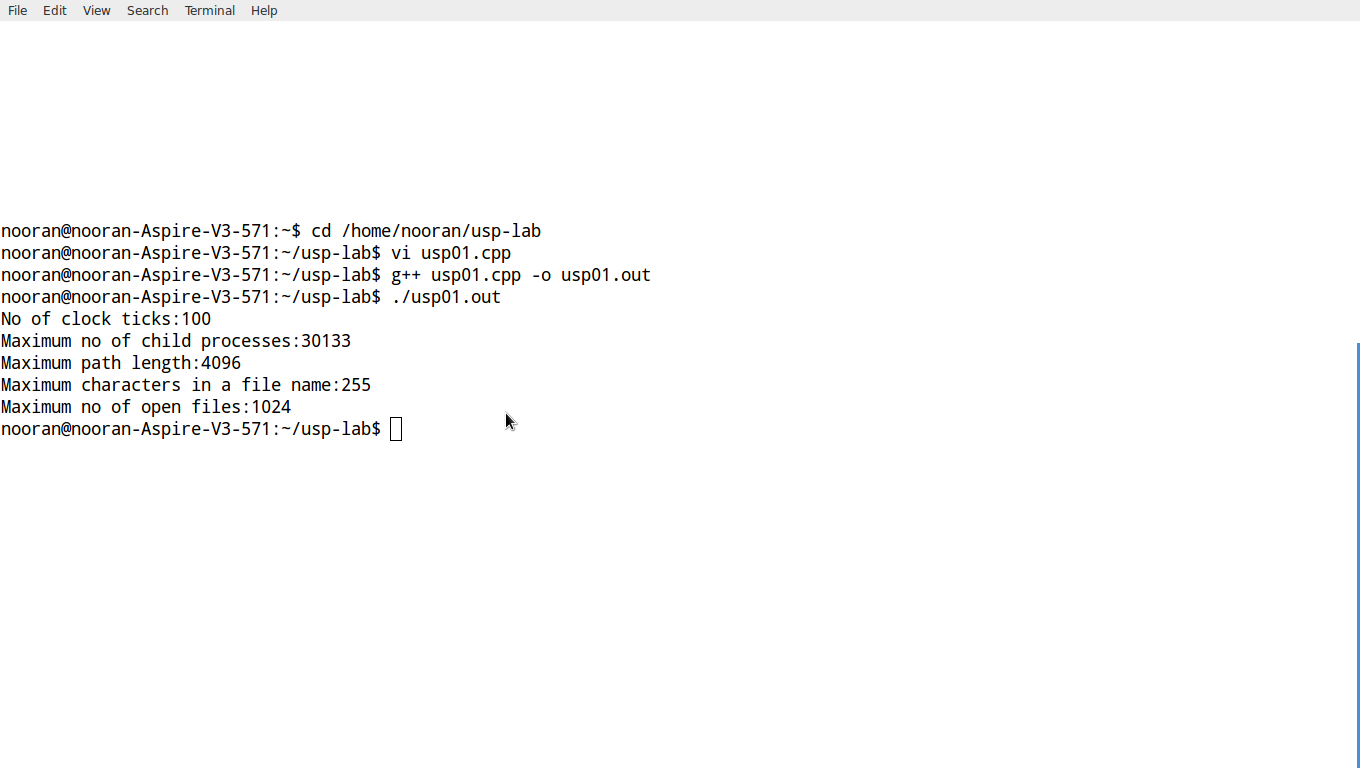Aim:
To Write a C/C++ POSIX compliant program to check the following limits:
(i) No. of clock ticks
(ii) Max. no. of child processes
(iii) Max. path length
(iv) Max. no. of characters in a file name
(v) Max. no. of open files/ process
Theory:
sysconf - Get configuration information at runtime
SYNOPSIS#include <unistd.h> long sysconf(int name);DESCRIPTION
POSIX allows an application to test at compile or run time whether certain options are supported, or what the value is of certain configurable constants or limits.At compile time this is done by including <unistd.h> and/or <limits.h> and testing the value of certain macros.
At run time, one can ask for numerical values using the present function sysconf(). One can ask for numerical values that may depend on the file system a file is in using the calls fpathconf(3) and pathconf(3). One can ask for string values using confstr(3). The values obtained from these functions are system configuration constants. They do not change during the lifetime of a process.
clock ticks - _SC_CLK_TCK The number of clock ticks per second. The corresponding variable is obsolete. It was of course called CLK_TCK. CHILD_MAX - _SC_CHILD_MAX The max number of simultaneous processes per user ID. Must not be less than _POSIX_CHILD_MAX (25). OPEN_MAX - _SC_OPEN_MAX The maximum number of files that a process can have open at any time. Must not be less than _POSIX_OPEN_MAX (20).
fpathconf, pathconf - Get configuration values for files
SYNOPSIS#include <unistd.h> long fpathconf(int fd, int name); long pathconf(char *path, int name);DESCRIPTION
fpathconf() gets a value for the configuration option name for the open file descriptor fd. pathconf() gets a value for configuration option name for the filename path. The corresponding macros defined in <unistd.h> are minimum values; if an application wants to take advantage of values which may change, a call to fpathconf() or pathconf() can be made, which may yield more liberal results._PC_PATH_MAX returns the maximum length of a relative pathname when path or fd is the current working directory. The corresponding macro is _POSIX_PATH_MAX. _PC_NAME_MAX returns the maximum length of a filename in the directory path or fd that the process is allowed to create. The corresponding macro is _POSIX_NAME_MAX.
Code:
#define _POSIX_SOURCE
#define _POSIX_C_SOURCE 199309L
#include "iostream"
#include <unistd.h>
using namespace std;
int main()
{
cout<<"No of clock ticks:"<<sysconf(_SC_CLK_TCK)<<endl;
cout<<"Maximum no of child processes:"<<sysconf(_SC_CHILD_MAX)<<endl;
cout<<"Maximum path length:"<<pathconf("/",_PC_PATH_MAX)<<endl;
cout<<"Maximum characters in a file name:"<<pathconf("/",_PC_NAME_MAX)<<endl;
cout<<"Maximum no of open files:"<<sysconf(_SC_OPEN_MAX)<<endl;
return 0;
}
Output:
Commands for execution:-
- Open a terminal.
- Change directory to the file location in the terminal.
- Run g++ usp01.c -o usp01.out in the terminal.
- If no errors, run ./usp01.out
Screenshots:
